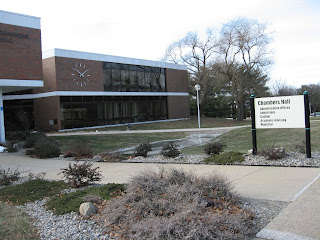General – Rowan University is a public university in New Jersey with about 14,000 undergrads. The Glassboro campus is flat and set on 200
acres, about 20 minutes from Philly.
Most of the buildings are red brick and there is a street going through
the middle of campus. A new business building and a new engineering building
are slated to open in January. Bikes and skateboards are popular ways to get
around campus.
The school is test optional for students with an average 3.5 high school GPA who write an extra essay, except for engineering or honors students.
The grades and scores needed for admissions into engineering are higher; engineering students need at least a 3.3 GPA and 1290 on the new SAT.
Art students have a portfolio requirement and music students need to audition.
Freshman retention is 91%. The scholarship deadline is 1/31 and the application deadline is 3/1.
Student body - About eighty per
cent of freshmen live on campus and twenty per cent are commuters; this is not
a suitcase school.
Academics – The average class size is 22 with classes capped
at 40 students. No Teaching Assistants
teach classes.
Internships are popular,
with over 250 companies recruiting each semester. Study abroad is available.
There are no co-ops.
The newest school at Rowan is the School of the Earth and
Environment and the newest program is Nutrition.
The most popular major in the school is biological science.
Education majors can start student teaching in their first
year and there is a child development center on campus. There is a 5-year
Bachelors/Masters program in education.
Engineering is hands-on with lots of projects.
Popular majors in the College of Humanities and Social
Sciences are Exploratory Studies (undeclared), Sociology and Law and Justice.
There is a 5-year Bachelors/Masters program in athletic
training.
There are a number of majors where students can complete
their Bachelors degree in three years, saving about $22,000.
The Honors program is by invitation only. Honors students generally have at least a 3.5
GPA and at least a 1775 on the old SAT.
Honors students have special housing, honors classes, and special trips.
Financial – Tuition, fees and room and board cost about
$25,000 per year. Merit aid of between
$2,000 and $21,000 per year is available.
 |
| Student Center with Law School Fair |
Social – The school has over 100 clubs, Greek life and NCAA
Division III athletics. The student center was bustling with a law school fair on the day I visited. The rec center has two pools, racketball courts, an indoor track and much more. There is plenty
to do on-campus on the weekends and there are also off-campus trips.
 |
| Rec Center |
 |
| Townhomes |
Food and housing – There are ten on-campus dining options. Learning communities are available. There is hall style and suite style housing
available for freshmen. The newest
housing, Holy Pointe, has air conditioning.
Upperclassmen have on-campus housing opportunities, including townhomes.





























